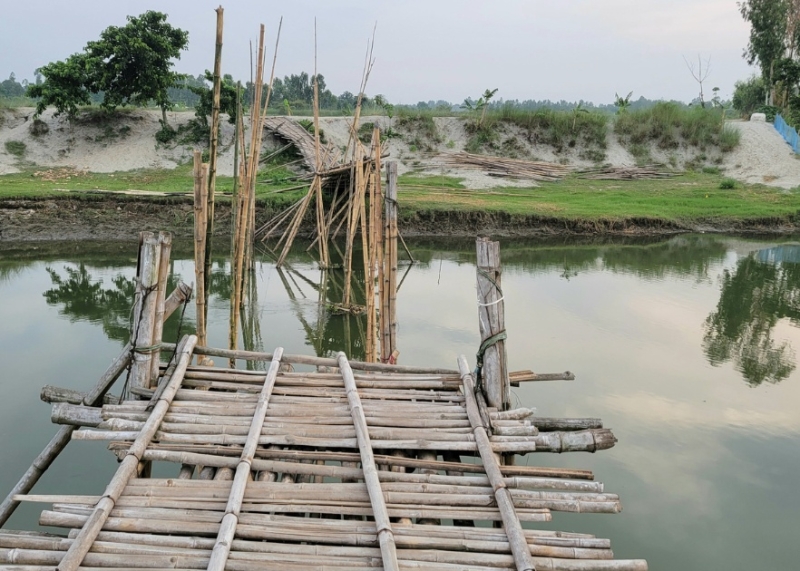- India Sees 9% Drop in Foreign Tourists as Bangladesh Visits Plunge |
- Dhaka Urges Restraint in Pakistan-Afghan War |
- Guterres Urges Action on Safe Migration Pact |
- OpenAI Raises $110B in Amazon-Led Funding |
- Puppet show enchants Children as Boi Mela comes alive on day 2 |
8 villages cut off as bamboo bridge broken in Kurigram

8 villages cut off as bamboo bridge broken in Kurigram
Kurigram , June 22 - Kurigram’s Fulbari upazila, once gently connected by a humble bamboo bridge, now stands witness to a daily struggle as residents of eight villages wade chest-deep or swim across the Baromasia (Banidaha) River.
A month has passed since the collapse of the 220-foot-long bamboo bridge in Naodanga union—yet no meaningful initiative has been taken to restore this vital lifeline.
Upon visiting the Nabiu’s Ghat—also known as Amin Member’s Ghat—in Kishamat Shimulbari, the extent of the devastation becomes painfully clear.
The southern portion of the bridge, spanning some 50 to 60 feet, has crumbled entirely, severing a crucial route for thousands. While some villagers brave the waters on foot, others are left with no choice but to swim across the river, their belongings held tightly above their heads.
For the past ten years, the bamboo bridge—erected through local initiative as the river gradually narrowed—had served as the only means of passage for the people of Kishamat Shimulbari, Char Gorokmandol, Jhaukuti, Pashchim Fulmati, Naodanga and Hokbazar of Shimulbari union, along with Char Kharua and Kharua villages under Lalmonirhat Sadar’s Kulaghat union.
The origins of the crossing date back to post-independence days, when small boats ferried passengers between the riverbanks. Over the years, locals remember crossing through Karim’s, Nabiul’s and finally Amin Member’s ghat—leased points for boat services.
But the river’s temperament and shape have changed, and so too have the means of crossing it. The bridge, lovingly patched and rebuilt each monsoon season, finally succumbed last month to heavy currents and the weight of accumulated water hyacinths pressing against its base.
“This suffering—there are no words left to speak,” sighed Aher Ali of Kishamat Shimulbari and Nur Islam of Jhaukuti. “It’s been a month, yet no one has taken the initiative to fix it. We cross the river every day with bicycles on our shoulders. No one cares about our pain.”
Voices of hardship echo across the banks. “What more is there to say? You can see for yourself,” said Marjina Begum and Jahanara Begum as they trudged through the water, firewood bundled on their heads.
“Every day, people come and take pictures, but no one does anything to ease our misery. The schools are closed now, but when they reopen, our children will suffer most. We demand the bridge be rebuilt before that happens,” she said.
Taslima Uddin of Char Kharua lamented the disruption to daily life. “Hundreds use this route to reach Balarhat Bazaar. Our children study at Naodanga School and Balarhat Adarsha School. This bridge was their path to education.”
Schoolchildren like Jewel Rana, Masud Rana, and Hasanur Rahman from Jhaukuti echoed this sentiment. “We’re swimming across for now, but once schools reopen, how will we carry our books and go to class? We are deeply worried.”
Even the river’s bounty is now a curse for some. Fish farmers Ataur Rahman Ratan and Mojibur Rahman Babu spoke of the immense trouble caused to their trade. “Our farms lie across the river. We cannot transport fish feed, nor can we sell the fish. Every trip means swimming the river again. This is unsustainable.”
They estimate that between 3,000 to 4,000 people cross the bridge daily. Yet, no one from the administration has so much as visited the site since the collapse. If the authorities step up to help, they are willing to contribute with money and labour, they said.
Former UP member of Kishamat Shimulbari, Aminul Haque, noted that the villagers have already begun collecting bamboo to rebuild the bridge. “But if the water level rises before reconstruction, the suffering will multiply. We need immediate government intervention.”
Naodanga Union Parishad Chairman Md Hossain Ali affirmed the urgency of the situation. “Even if it takes a collective effort, the broken bridge must be rebuilt without delay. I appeal to the concerned authorities and urge local residents to come forward.”
When approached, Fulbari Upazila Project Implementation Officer Siraj Uddoula offered reassurance: “A field visit will be arranged very soon, and the matter will be reported to higher authorities. Once funds are allocated, the bamboo bridge will be reconstructed.”
For now, though, the waters of the Baromasia continue to test the endurance of a forgotten people, whose only plea is the restoration of a simple bridge that once stitched together their lives. - UNB

